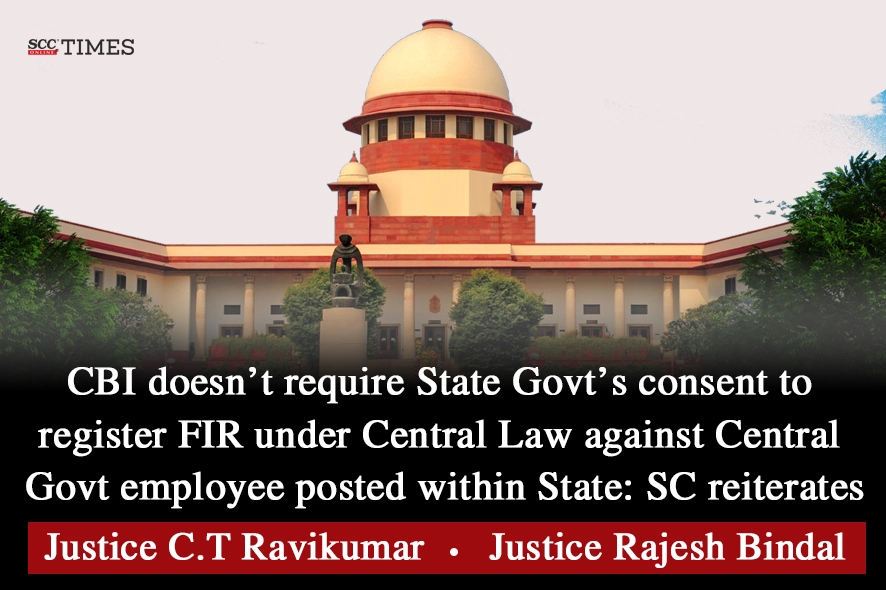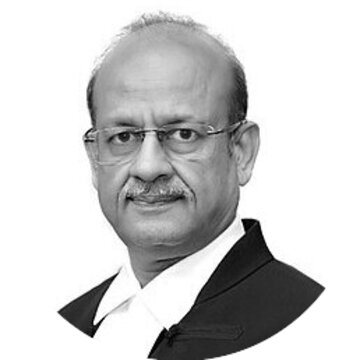Supreme Court: In a set of two criminal appeals by the Central Bureau of Investigation (‘CBI’) assailing the Andhra Pradesh High Court’s judgments for quashing of proceedings under the Prevention of Corruption Act, 1988 (‘PC Act’), the Division Bench of CT Ravikumar* and Rajesh Bindal, JJ. allowed the appeals and set aside the impugned decision reiterating that the CBI does not require permission from the State Government to register an FIR under the Central Legislation against a Central Government employee.
Factual Matrix
A First Information Report (FIR) was registered for offences under Section 7 of the PC Act against the accused person while he was working as Superintendent, Central Excise, Nandyal, Andhra Pradesh on the allegations that he demanded and accepted an illegal gratification of ₹10,000/- from the original complainant, who was a contractor for issuance of licence surrender certificate.
In the latter appeal, against the accused person therein, FIR was registered under Section 7 of the PC Act. It was alleged that while working as an accounts assistant in the office of Senior Divisional Financial Manager, Guntakal, he demanded and obtained ₹15,000/- as illegal gratification from the original complainant for doing official favour of processing contract bills.
As per the Andhra Pradesh Re-Organisation Act, 2014 (‘the A.P. Re-Organisation Act’), Andhra Pradesh was bifurcated geographically into two States namely, the Andhra Pradesh and the Telangana. On 28-03-2019, the CBI, policy division order, redefining the territorial jurisdiction of CBI, ACB, Hyderabad and Vishakhapatnam branches was issued. On 03-09-2019, the High Court of Telangana issued a notification regarding the jurisdiction of four Rayalaseema Districts of the State of Andhra Pradesh, namely, Kurnool, Kadappa, Chittoor and Ananthapur and for their inclusion in the jurisdiction of CBI Courts Vishakhapatnam by deleting the same from the jurisdiction of CBI Courts at Hyderabad.
The cases were transferred from the Additional CBI Court, Vishakhapatnam to Kurnool. The accused person contended that the subject FIRs were registered by the CBI, ACB, Hyderabad in Telangana whereas the alleged offence in those FIRs had taken place in Kurnool and Ananthapur districts which were and still, within Andhra Pradesh, and further that on the dates of registration of those FIRs, there was no express permission as required under Section 6 of the Delhi Special Police Establishment Act, 1946 (‘DSPE Act’) to register them and also to investigate the same. It was also contended that Andhra Pradesh did not accord consent for prosecution of Central Government servants under the provisions of the PC Act and therefore, Special Court for CBI Cases, Hyderabad could not have entertained the case.
The High Court in the impugned decision answered the issue, of ‘whether the lack of consent as also the lack of notification for a Special Court under the PC Act would go into the root of the matter and thereby vitiate the proceedings’ in the affirmative. Resultantly, the registration of the respective FIR and filing of the chargesheets were held as vitiated for the absence of consent from the State of Telangana to the CBI, to register the FIRs and conduct investigation.
Analysis and Decision
The Court referred to CCT v. Swarn Rekha Cokes and Coals (P) Ltd., (2004) 6 SCC 689, wherein, while considering the question of continuity of laws in force in the erstwhile State in the new States carved out of erstwhile State with reference to the Bihar Reorganisation Act, 2000, it was held that the laws which were applicable to the undivided State of Bihar would continue to apply to the new States created by the Act and that the laws that operated would continue to operate notwithstanding the bifurcation of the erstwhile State of Bihar and creation of the new State of Jharkhand. They would continue in force until and unless altered, repealed or amended, it was further held.
The Court noted that in terms of Sections 3 and 4 of the PC Act, only a Special Judge designated as such by notification, by a State or Central Government would have the power to entertain cases under the provisions of the PC Act. Regarding the question of consent, the Court said that under government orders according general consent to exercise the powers and jurisdiction under DSPE Act against private persons for alleged offences whether acting separately or in conjunction with Central Govt./undertaking employees and State Govt. employees upto first gazetted level, to all members of DSPE. The Court added that this does not mean that employees of the Central Government/ Central Government undertaking and State Government employees up to first gazetted level are beyond the reach of the CBI and only private persons acting separately or in conjunction with such categories of employees alone can be proceeded against. The Court held that the High Court erred in holding that there was no notification issued conferring the status of Special Court in terms of Section 4 of the PC Act to the CBI Court, Hyderabad. Hence, the terms of the provisions under circular memo dated 26-05-2014 all “laws” applicable to the undivided State of Andhra Pradesh on 01-06-2014 would continue to apply to the new States, namely, the State of Telangana and the State of Andhra Pradesh despite the bifurcation of the erstwhile State of Andhra Pradesh till such time they were altered, repealed or amended.
In the matter at hand, the Court said that irrespective of the place of posting of the accused persons, they were Central Government employees/Central Government Undertaking employees and allegedly committed serious offence under PC Act, which is a Central Act. The Court stated that the question that merely because such an employee works within the territory of a particular State, to register an FIR by the CBI in connection with commission of an offence under a Central Act whether consent from the State Government concerned is required or not, is no longer a legal conundrum in view of Kanwal Tanuj v. State of Bihar, (2020) 20 SCC 531, wherein it was held that- such a consent may not be necessary regarding the investigation by the special police force (DSPE) in respect of specified offences committed within Union Territory and other offences associated therewith. That may be so, even if one of the accused involved in the given case may be residing or employed in some other State (outside the Union Territory) including in connection with the affairs of the State/local body/corporation, company or bank of the State or controlled by the State/institution receiving or having received financial aid from the State Government, as the case may be. Taking any other view would require the special police force to comply with the formality of taking consent for investigation even in relation to specified offence committed within Union Territory, from the concerned State merely because of the fortuitous situation that part of the associated offence is committed in other State and the accused involved in the offence is residing in or employed in connection with the affairs of that State.
Therefore, the Court allowed the appeals and set aside the impugned judgment whereunder subject FIRs and further proceedings in pursuance thereof, were quashed.
CASE DETAILS
|
Citation: Appellants : Respondents : |
Advocates who appeared in this case For Petitioner(s): For Respondent(s): |
CORAM :








